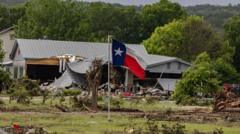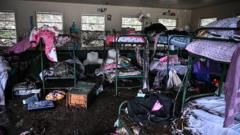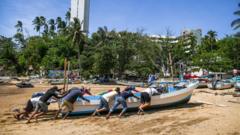In a devastating turn of events, torrential rains have wreaked havoc in Kinshasa, the capital city of the Democratic Republic of Congo, resulting in the tragic deaths of at least 33 individuals. President Félix Tshisekedi has expressed his commitment to supporting the victims during a government crisis meeting held on Monday. As desperate residents attempt to escape the floodwaters, many are resorting to wading, swimming, or using makeshift canoes to seek safety.
Torrential Rain Claims Lives in Kinshasa: A City in Crisis

Torrential Rain Claims Lives in Kinshasa: A City in Crisis
Severe flooding in the Democratic Republic of Congo's capital has left at least 33 dead, with rising waters threatening homes and infrastructure.
The city, which is home to 17 million people and situated along the mighty Congo River, is no stranger to flooding. However, the river has recently reached its highest levels in sixty years, exacerbating the situation. Officials indicate that climate change is intensifying the frequency and severity of such disasters in the region, with President Tshisekedi having previously warned about the consequences of the ongoing climate crisis.
In the aftermath of the deluge that struck overnight from Friday to Saturday, reports indicate that significant portions of Kinshasa's western neighborhoods have been left devastated. Estimates from local authorities suggest that around half of the capital's 26 districts have been affected, prompting the deployment of search and rescue teams to assist those in peril.
Residents in the hardest-hit areas, particularly its poorest neighborhoods, have shared harrowing accounts of being trapped. Christophe Bola, a resident of the Ndanu area, described floodwaters reaching heights of 1.5 meters, leaving many trapped in their homes. Frustration has mounted among residents over the perceived slow response of authorities, who some accuse of failing to provide adequate assistance in the face of the crisis.
Additionally, the flooding has disrupted water supply across much of Kinshasa, with treatment facilities rendered inoperable due to inundation. Critical transport routes, including the main road linking the city center with the international airport, have been rendered impassable. Following the overwhelming overflow of the N'djili River, Deputy President Jacquemain Shabani highlighted the dire situation many residents are facing.
Compounding the crisis, authorities face ongoing challenges related to inadequate sewage maintenance and urban planning, issues that have long plagued the city. With continued heavy rains forecasted in the coming weeks, the repercussions of this disaster may only worsen, with additional warnings issued for other regions of the country, such as the eastern city of Goma, which has recently grappled with civil unrest.
In summary, the recent torrential rains in Kinshasa have unleashed devastation with profound implications for the city's population and infrastructure. As the government and citizens come to terms with the immediate consequences of this disaster, the looming threat of future downpours introduces further uncertainty for the beleaguered capital.
In the aftermath of the deluge that struck overnight from Friday to Saturday, reports indicate that significant portions of Kinshasa's western neighborhoods have been left devastated. Estimates from local authorities suggest that around half of the capital's 26 districts have been affected, prompting the deployment of search and rescue teams to assist those in peril.
Residents in the hardest-hit areas, particularly its poorest neighborhoods, have shared harrowing accounts of being trapped. Christophe Bola, a resident of the Ndanu area, described floodwaters reaching heights of 1.5 meters, leaving many trapped in their homes. Frustration has mounted among residents over the perceived slow response of authorities, who some accuse of failing to provide adequate assistance in the face of the crisis.
Additionally, the flooding has disrupted water supply across much of Kinshasa, with treatment facilities rendered inoperable due to inundation. Critical transport routes, including the main road linking the city center with the international airport, have been rendered impassable. Following the overwhelming overflow of the N'djili River, Deputy President Jacquemain Shabani highlighted the dire situation many residents are facing.
Compounding the crisis, authorities face ongoing challenges related to inadequate sewage maintenance and urban planning, issues that have long plagued the city. With continued heavy rains forecasted in the coming weeks, the repercussions of this disaster may only worsen, with additional warnings issued for other regions of the country, such as the eastern city of Goma, which has recently grappled with civil unrest.
In summary, the recent torrential rains in Kinshasa have unleashed devastation with profound implications for the city's population and infrastructure. As the government and citizens come to terms with the immediate consequences of this disaster, the looming threat of future downpours introduces further uncertainty for the beleaguered capital.




















